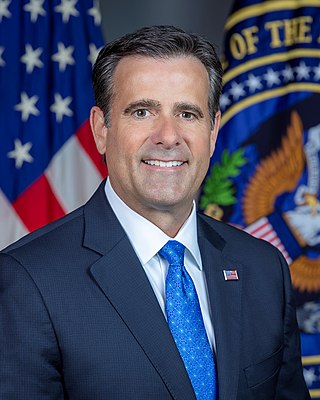Related Research Articles
The Cabinet of the United States is the principal official advisory body to the president of the United States. The Cabinet generally meets with the president in a room adjacent to the Oval Office in the West Wing of the White House. The president chairs the meetings but is not formally a member of the Cabinet. The vice president of the United States serves in the Cabinet by statute. The heads of departments, appointed by the president and confirmed by the Senate, are members of the Cabinet, and acting department heads also participate in Cabinet meetings whether or not they have been officially nominated for Senate confirmation. Members of the Cabinet are political appointees and administratively function their departments. As appointed officers heading federal agencies, these Cabinet Secretaries are bureaucrats with full administrative control over their respective departments. The president may designate heads of other agencies and non-Senate-confirmed members of the Executive Office of the President as members of the Cabinet.
The Heritage Foundation is an American conservative think tank based in Washington, D.C. Founded in 1973, it took a leading role in the conservative movement in the 1980s during the presidency of Ronald Reagan, whose policies were taken from Heritage Foundation studies, including its Mandate for Leadership.

The Hatch Act of 1939, An Act to Prevent Pernicious Political Activities, is a United States federal law that prohibits civil-service employees in the executive branch of the federal government, except the president and vice president, from engaging in some forms of political activity. It became law on August 2, 1939. The law was named for Senator Carl Hatch of New Mexico. It was most recently amended in 2012.

A loyalty oath is a pledge of allegiance to an organization, institution, or state of which an individual is a member. In the United States, such an oath has often indicated that the affiant has not been a member of a particular organization or organizations mentioned in the oath. The U.S. Supreme Court allows the oath to be a form of legal document.

The United States Office of Personnel Management (OPM) is an independent agency of the United States government that manages the United States federal civil service. The agency provides federal human resources policy, oversight, and support, and tends to healthcare (FEHB), life insurance (FEGLI), and retirement benefits for federal government employees, retirees, and their dependents.

From the independence of the United States until today, various movements within Canada have campaigned in favor of U.S. annexation of parts of or all of Canada. Historical studies have focused on numerous small-scale movements which are helpful in comparisons of Canadian and American politics.

The Economic Research Service (ERS) is a component of the United States Department of Agriculture (USDA) and a principal agency of the Federal Statistical System of the United States. It provides information and research on agriculture and economics.
The Commission on Protecting and Reducing Government Secrecy, also called the Moynihan Commission, after its chairman, U.S. Senator Daniel Patrick Moynihan, was a bipartisan statutory commission in the United States. It was created under Title IX of the Foreign Relations Authorization Act for Fiscal Years 1994 and 1995 to conduct "an investigation into all matters in any way related to any legislation, executive order, regulation, practice, or procedure relating to classified information or granting security clearances" and to submit a final report with recommendations. The Commission's investigation of government secrecy was the first authorized by statute since the Wright Commission on Government Security issued its report in 1957.

Donald John Trump is an American politician, media personality, and businessman who has served as the 47th president of the United States since January 20, 2025. A member of the Republican Party, he previously served as the 45th president from 2017 to 2021.

Equal employment opportunity is equal opportunity to attain or maintain employment in a company, organization, or other institution. Examples of legislation to foster it or to protect it from eroding include the U.S. Equal Employment Opportunity Commission, which was established by Title VII of the Civil Rights Act of 1964 to assist in the protection of United States employees from discrimination. The law was the first federal law designed to protect most US employees from employment discrimination based on that employee's race, color, religion, sex, or national origin.
The United States federal civil service is the civilian workforce of the United States federal government's departments and agencies. The federal civil service was established in 1871. U.S. state and local government entities often have comparable civil service systems that are modeled on the national system to varying degrees.

President Harry S. Truman signed United States Executive Order 9835, sometimes known as the "Loyalty Order", on March 21, 1947. The order established the first general loyalty program in the United States, designed to root out communist influence in the U.S. federal government. Truman aimed to rally public opinion behind his Cold War policies with investigations conducted under its authority. He also hoped to quiet right-wing critics who accused Democrats of being soft on communism. At the same time, he advised the Loyalty Review Board to limit the role of the Federal Bureau of Investigation (FBI) to avoid a witch hunt. The program investigated over 3 million government employees, just over 300 of whom were dismissed as security risks.

Brian H. Hook is an American diplomat, lawyer and government official. In 2021, he joined Cerberus Capital Management as vice chairman for global investments. He is an adjunct professor at Duke University's Sanford School of Public Policy.

According to the United States Office of Government Ethics, a political appointee is "any employee who is appointed by the President, the Vice President, or agency head". As of 2016, there were around 4,000 political appointment positions which an incoming administration needs to review, and fill or confirm, of which about 1,200 require Senate confirmation. The White House Presidential Personnel Office (PPO) is one of the offices most responsible for political appointees and for assessing candidates to work at or for the White House.

John Lee Ratcliffe is an American politician and attorney who is serving as the ninth director of the Central Intelligence Agency (CIA) since 2025. He previously served as the sixth director of national intelligence from 2020 to 2021 and served in the United States House of Representatives from 2015 to 2020.
The deep state conspiracy theory in the United States is an American political conspiracy theory that the deep state is a clandestine network of members of the federal government. The theory is that the network collaborates with high-level financial and industrial entities and leaders, to exercise power alongside or within the elected United States government.

Michael Evan Horowitz is an American attorney and government official. He is the Inspector General of the United States Department of Justice.
Mari Stull is an American blogger, lobbyist, and former Trump administration political appointee to the United States Department of State's Bureau of International Organization Affairs. She is alternatively known as the Vino Vixen and by her maiden name, Mari Dunleavy.
In April and May 2020, United States President Donald Trump dismissed the inspectors general (IGs) of five cabinet departments in the space of six weeks. The inspectors general removed were Michael K. Atkinson, Intelligence, on April 3; Glenn Fine (acting), Defense, April 7; Christi Grimm (acting), Health and Human Services, May 1; Mitch Behm (acting), Transportation, May 15; and Steve Linick, State, May 15. In four of the cases the announcement was made late on a Friday night in a classic Friday news dump. In several cases the fired IGs had taken an action which Trump disliked, so that the dismissals were widely described as retaliation. In two other cases, questions were raised about whether the dismissals related to ongoing IG investigations into the conduct of the cabinet secretary in charge of that department. The cumulative firings were often described as a "purge" or as a "war on watchdogs".
Schedule Policy/Career, formerly known as Schedule F, is a job classification for appointments in the excepted service of the United States federal civil service for permanent policy-related positions. The purpose of the provision is to increase the president's control over the federal career civil service by removing their civil service protections and making them easy to dismiss, which proponents stated would increase flexibility and accountability to elected officials. It was widely criticized as providing means to retaliate against federal officials for political reasons, impede the effective functioning of government, and providing risk to democracy. It has been estimated that tens or hundreds of thousands of career employees could be reclassified, increasing the number of political appointments by a factor of ten.
References
- ↑ Detailees at U.S. Office of Government Ethics site
- 1 2 "Loyalty tests and MAGA checks: Inside the Trump White House's intense screening of job-seekers". AP News. 2025-01-25. Retrieved 2025-01-25.